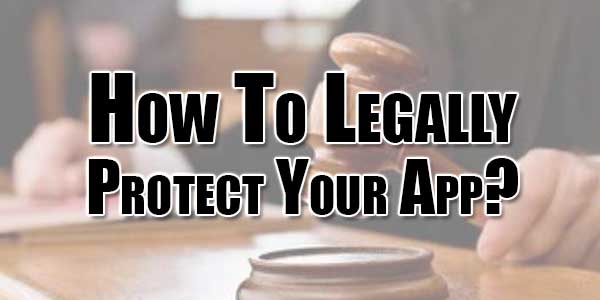
Are you building a new app that is going to be the biggest star in the mobile galaxy? If yes, before you launch this stellar app, with a bang (pun intended), it’s important to equip it with a sound legal safety-net. Why, you ask? Well, because laws exists for a reason. Flout it (or worse be ignorant of it) and you are certain to be sucked into a vortex of doom. The legal kind. And by this time, all legalese will sound like ‘alien-speak’. Finally, this sort of legal risk would amount to terrible fines, long law-suits, business losses & even the inability to ever launch your app.
Here are the top 4 legal caveats to consider for a 100% legally protected app:
Table of Contents
Protect The Idea – The Nerve-Center Of Your APP:
You have a revolutionary idea for an app – look at it as your special super-power. But the problem is that no law can safeguard it from be plagiarized. That’s where it becomes so important to share your ideas sparingly with third-parties, when you are starting out with getting your app modeled.
Everyone does not need to know your app’s complete design & business model. So, choose partners carefully and get them to sign Non-Disclosure Agreements (NDAs). This will ensure that you will not lose out of your first-mover advantage, even before the app is ready to go live.
Own The App, COMPLETELY:
Not just the idea of the app, but you need to have legal right over everything from the back-end code to the design. This is where written/printed contracts come in handy. If some of the app code comes from an open source, it’s important to own a license copy and read through it thoroughly. This way you will know exactly for what purposes the open source can be used for.
If you have a team of developers and different software sources to create the app for you. Make sure you consolidate title – so that one entity owns all the rights to the software. Also have a contract detail out that you own all the intellectual property rights to the software. If you plan to own the app with the programmers/other entities, then outline exactly who owns what part of the app & also how the revenue from the app will be split.
Create Transparent Privacy Policies:
Consumers today see privacy policy details pop-up on their app, and just ignore it all together. But if mobile app developers were to ever de-prioritize this, it would be a law-suit just waiting to happen. So attention to detail & transparency, in this segment, is of top-most priority.
But how do you know what elements need to be declared up-front?
Firstly: Check if there are any potentially unexpected (not-so-positive) user experiences connected with your app. Then, announce them to the users and the prospective installers. For instance, if you have been hearing complains about the app charges, be upfront about costs levied from the user, for the use of the app.

Secondly: Always document your app’s functionalities and provide legal accountability for your actions vis-à-vis the app.
For instance, you need to resolutely list down the information that the app collects from the user and his device – User’s location, contacts, unique device identifiers, identity, payment and browsing data. Then also highlight if this information will be shared with others and how it will be used. This privacy policy should also clearly detail the right of users to edit, erase or block their data- apart from how long collected data will be held.

Key Things To Remember:
Now that you have the crucial elements of the privacy policy covered, always remember:
- Never copy another app’s privacy policy word-to-word. Not only is it unethical, it can also be very misleading! Always get legal help to draft the document.
- All your app stakeholders, from employees & contractors to agents must understand and follow your privacy policy and practices.
- The app’s privacy policy document should be easily accessible – from the app store and also within app after installation.
- Keep abreast with the latest privacy policy-related news.
- All changes in app policies, at every point since your app’s launch, needs to be highlighted!
- Make sure that the personal data that you collect adheres to the law of the countries where it will be used. For instance, even if your app was created in the USA, but has users in South Africa, Russia & India – it needs to follow privacy laws in all these countries.
- Exercise extra caution when it comes to apps made for children’s use. No matter how clear a privacy policy is, it may not be possible to obtain real consent from kids. So, avoid collecting their ‘personal data’, unless you can get verified consent from their parents. Also most countries prohibit the use of data collected from kids for things like online behavioral advertising. Be sure to speak with legal counsel ASAP, if you access or store information about children under 13 years of age.
- Even if you don’t collect personal information, it’s best to still have a Privacy Policy informing users of the same.
Get Sound Legal Counsel:
No matter how much you read up about legal issues online, there will always be something you will miss out on. So err of the side of caution and ALWAYS get an experienced legal counsel to help you frame your legal documents.
Think you are in the safe because you have a comprehensive privacy policy document updated on your app? Think again.
The principal issue is whether you clearly communicated important terms — like charges and personal data practices — to the consumer, in a way that is clearly understood and accepted. That means ensuring that your app needs to takes the user through these key terms in a user-friendly & crisp manner.

 About the Author:Shishir Dubey, founder of
About the Author:Shishir Dubey, founder of 












Be the first to write a comment.